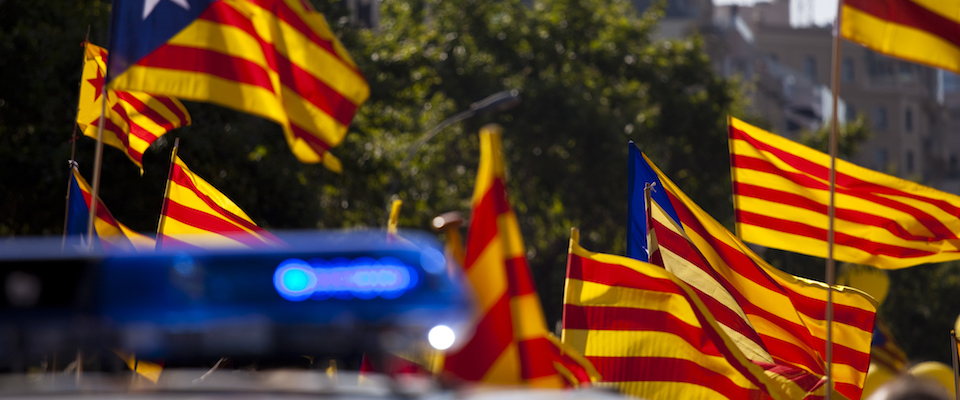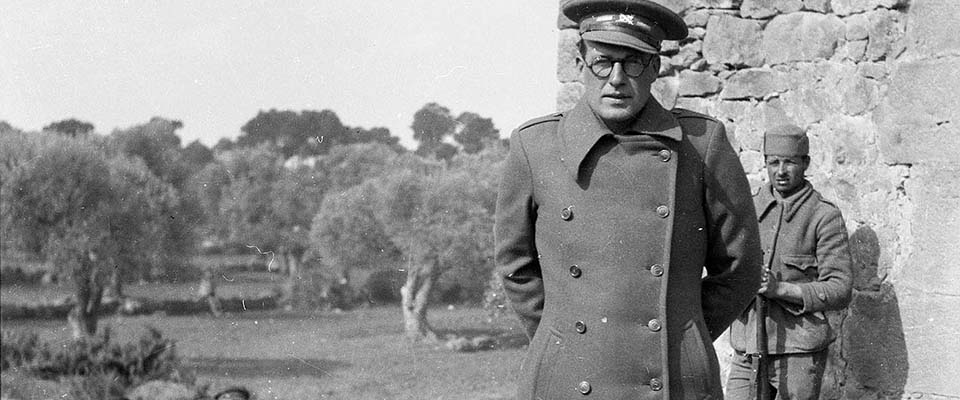A lot has changed since the 1992 Summer Olympics brought worldwide attention to the northeast Spanish region of Catalonia and its capital, Barcelona. Today, Catalonia—the birthplace of architect Antoni Gaudí and painter Salvador Dalí, and one of Spain’s wealthiest regions—is in a bitter political struggle with the central government in Madrid over the issue of Catalan independence.
The modern roots of the conflict date back to the regime of dictator Francisco Franco, who for decades suppressed Catalan institutions and language. After his death in 1975, and Spain’s subsequent transition to democracy, Catalan nationalism resurged and with it, a call for self-rule. In 2006, a statute to give the region greater fiscal autonomy, strengthen the status of the Catalan language, and recognize Catalonia as a nation within Spain was negotiated between the Catalan and Spanish parliaments and approved by Catalan voters in a referendum.
But, in 2010, when the Spanish Constitutional Court struck down and modified parts of the statute, more than a million of Catalonia’s 7.5 million people took to the streets. Once-marginal support for independence grew, while Spanish Prime Minister Mariano Rajoy and his conservative Popular Party opposed efforts to bolster Catalan regional autonomy, further galvanizing secessionists. The situation intensified on October 1, 2017, when then Catalan president Carles Puigdemont, backed by both conservative and leftist Catalan parties, defied the Spanish government and courts and held a referendum on independence.
Madrid responded by sending in riot police to seize ballot boxes and disrupt the vote, injuring hundreds of people. With a low turnout of 42 percent of registered voters, largely due to a boycott of the referendum by anti-independence parties, the pro-independence camp received 90 percent of the vote. On October 27, the Catalan parliament declared Catalonia’s independence, to which Madrid responded by imposing direct rule and calling for new regional elections to take place that December. About two dozen Catalan politicians and civil society leaders who organized the referendum were charged with rebellion, mismanagement of public funds, and disobedience. Some were jailed while others, including Puigdemont, fled Spain.
Although pro-independence parties won a majority of seats in the snap December elections, it took until May for the Catalan parliament to elect a new president, a first step to forming a government and ending Madrid’s direct rule. Throughout the conflict, the U.S. and the EU, of which Spain is a member, have maintained that the conflict is a domestic matter and that Spain should remain unified. Madrid’s chronic antagonism towards Catalonia’s independence movement, however, continues to test Spain’s democratic institutions and the EU’s ability to uphold democratic norms.
For a Catalan perspective, we spoke with Catalan economist and former Berkeley economics and mathematics professor Andreu Mas-Colell. After a long academic career at Berkeley and Harvard University, Mas-Colell returned to Catalonia in the 1990s, where he was a founding board member of Barcelona’s Pompeu Fabra University and head of its economics department, as well as founder of the Barcelona Graduate School of Economics. Mas-Colell served in a number of positions within the Catalan government, including Minister of Economy and Knowledge from 2010 to 2016. Mas-Colell is currently a professor emeritus of economics at Pompeu Fabra University.
This conversation has been edited for length and clarity.
Many Americans remember Barcelona from the 1992 Summer Olympics, but they may not remember hearing much about Catalan independence back then. How did we get from the 1990s to a point where the people of Catalonia are evenly split on the issue of independence?
It is good to begin with Spain’s transition from the Franco dictatorship to democracy, when the long-standing issue of how to accommodate two culturally distinct groups—the Basques and the Catalans—reemerged. Both the Catalan and Basque identities were officially suppressed in the Franco period, so the restoration of democracy and the recognition of these regions as historical communities with rights came simultaneously. This was embodied in the 1978 Constitution and then in the development of statutes of autonomy for those two areas, and then for the rest of the regions in Spain. But the Spanish constitution never defined Spain as a federation, like Germany or the United States. For the Basques and Catalans, this was ambiguous enough that there was a hope that this situation could evolve toward a good accommodation. For other political sectors in Spain, in particular the more conservative ones that had been the base of the Franco regime, the reemergence of the territorial issue was collateral damage of the evolution toward democracy. So, you have this tension from the moment of the transition: For the Basques and Catalans, the ambiguities had to lead to further decentralization; for the conservative part of the Spanish political establishment, they had to be resolved by further centralization.
This worked until roughly the year 2000, when the Popular Party, which is a conservative party, got an absolute majority in the Spanish parliament. In 2004, the Popular Party loses power, and the Socialists come back into government. The Socialists wanted to find a compromise with the Catalan regional government, and a new statute of autonomy for the region was worked out in 2006. So that should have settled things, but it didn’t because the Popular Party used this negotiation against the Socialist Party and challenged the statute in the Constitutional Court. And the Constitutional Court in 2010 was a Constitutional Court dominated by Popular Party appointees who decided that a number of key aspects of the statute were not constitutional.
The consequence was that a substantial sector of the Catalan opinion that had been kept at bay with the arrangement of the 2006 statute shifted their position toward the pro-independence side. In the Catalan case, the radicalization of the political elites was very conditioned by public opinion—the very peaceful but enormous mass demonstrations in favor of independence. And if before 25 percent of the population was pro-independence and 25 percent was intensively pro-autonomy of Catalonia but not necessarily pro-independence, the pro-independence vote shifted to nearly 50 percent. The politics of the Spanish government have been unyielding. There have been many calls for negotiation, and it is very obvious to me that if there was a real negotiation, this 25 percent of the Catalan population that was not pro-independence ten years ago could be in favor of some type of settlement.
What are the concerns of those who are in favor of Catalan independence?
One is the matter of identity and culture. This will be the same type of issue that you see in Quebec or Scotland. We have a distinctive history and a distinctive language. Catalan is a Latin language and closely related to Spanish, Italian, Portuguese, and French. It has a known literature starting in the Middle Ages and is a language of culture. In Catalonia, it is the mother tongue of something like 40 percent of the population, spoken by 75 percent, and understood by 100 percent of the population. It was forbidden and repressed during the Franco period, and absent from school. For example, my mother tongue is Catalan, which I spoke with my parents and my friends but not at school because I was educated during the Franco period.
Because Catalan and Spanish are close, a choice was made in Catalonia after the transition to democracy to have a single school system that would aim at perfect bilingualism—that is, everyone who goes through the Catalan education system would come out with an equal and good command of both languages. And this is what essentially has been accomplished. So why is that contentious? Well, it’s contentious because there are people in Spain, particularly on the more conservative side, who do not think that Catalan should be at the same level as Spanish in Catalonia.
The second issue is the fact that Catalonia is a net contributor to the Spanish budget [meaning that Catalonia pays more into the central budget than what it gets back in regional spending] and thus transfers its fiscal resources to the rest of Spain. Until roughly 2010 or so, this was never an issue of contention, but the political crisis made people more sensitive about these economic matters. Some of the sentiment was that this is a deal, and what Catalonia wants in return for its financial contribution is self-government.
The third issue is that Spain is a very centralized country. It’s enough to look at the map of high-speed trains to see it. The justice system is totally centralized.
Finally, there is the very strong rivalry between Madrid and Barcelona, including in soccer!
Put this cocktail together, and it’s obvious that it demands dialogue, negotiation, and coming to terms. It demands political finesse, and we haven’t had political finesse.
London and Edinburgh reached an agreement whereby Scotland held a referendum on independence in 2014. Why wasn’t a similar arrangement worked out in the Catalan case?
It beats me why it wasn’t possible. I mean the Catalan government and this mass movement asked for a referendum. The Spanish government said “no” to that. The Spanish government could have said “yes,” and my impression is that, as in Quebec and Scotland, the pro-independence side would have lost in the referendum. I suppose some of the people pushing for independence in Catalonia were thinking that a referendum would force a more accommodating position by Madrid toward the issues that were worrying Catalans, and thus self-government would be improved even if the pro-independence side lost. But this hasn’t happened because the conservative side in Spain doesn’t want to accept the principle that Catalonia or the Basque Country could separate.
I think that the Spanish government should have taken October 1 as a similar thing that happened in 2014 when there was a poll in Catalonia on independence called a consultation, and the Spanish government just looked in the other direction. The Spanish government could have argued perfectly well that the October 1 vote had no legal value and dismissed it. In fact, it had no legal value. But instead it said, “this is not taking place,” and you had police beating people in polling places. This increased the political tensions enormously. There was a surge in Spanish nationalism in Spain and Catalan nationalism in Catalonia. The immediate effect was a general strike in Catalonia, but this was kept always very peaceful. At this point, some of the leaders of the Catalan grassroots organizations were put in jail. The Popular Party was derelict in its responsibilities. It should have handled this politically but decided to shift the issue to the judges. Now the leadership of the judiciary is in charge of the situation, and their position is ultra conservative.
Don’t take me wrong: I’m not saying that everything has been done well from the Catalan side. I think that October 1 was an exercise in freedom of expression, and that was fine. But I don’t think that the Catalan parliament should have proclaimed independence on October 27. I think that was a rushed move. There were two possibilities on the Catalan side: One possibility was to take October 1 as another expression of democratic will and of sentiment that had to be accommodated in a negotiation, and that’s what many of us pushed for. The second was to go ahead and take it as a real referendum and proclaim independence. And, unfortunately, that second position prevailed.
Why did the Catalan parliament proclaim independence on October 27, especially since it was not clear whether a majority of Catalan voters were for it?
It’s a bad example of politics. Everybody knew that the declaration of independence on October 27 could not stick. So, why do something that you know will not stick? Because of internal rivalries on the pro-independence side. There is not a single pro-independence party but three, and two of them are competing for the same voters. The sentiment in the streets was very strong to not stop, and the parties were not able to coordinate and tell the grassroots that independence should not be proclaimed.
What has been the European Union’s response to the events in Catalonia?
This whole issue is very uncomfortable for the European leadership. The last thing they want is this sort of conflict in Spain. The Catalan pro-independence movement is very pro-Europe, and Spain is also very pro-Europe. From the Catalan side, European mediation would be very welcome. The Spanish government doesn’t want European mediation at all. But at this point, Europe is implicated because of the exiled Catalan politicians. For the Spanish government, it’s a slap on the face that the exiled Catalan leadership has not been extradited to Spain. [This spring, a German court rejected Spain’s request to extradite Puigdemont on charges of rebellion, and a Belgian court rejected to extradite three former Catalan ministers on charges of rebellion and misappropriation of public funds.]
The judiciary in Europe will have a lot to say and have a very strong influence on what happens in Spain, but the most desirable thing would be for some discreet European mediation. I don’t know, but it could be that some of that has been going on already. When the Spanish government imposed direct rule in Catalonia on October 27, it also, to everybody’s surprise, called for elections on December 21, which was very welcomed. One possible explanation is that Europe told the Spanish government that it needed to be proportionate and sensible in this conflict.
Do you see a resolution to the ongoing political crisis in Catalonia? And what do you hope to have happen?
I think we’ll have to contemplate the future in two phases: The first is the phase of the normalization of the situation. I think that that may happen in a year or two. The new Catalan government has to administer what it can administer—which is a lot. What I hope from the Catalan side is that there is a government committed to not taking any unilateral measures and to being within the bounds of the law, even if it does not agree with how the law is interpreted. What I hope from the Spanish side is that there is an effort to end the repression of the pro-independence movement. Right now, the situation is more poisoned than it used to be because there are people who had been completely peaceful but are kept in jail without bail 700 kilometers away from their families; there are people in exile. The Spanish government doesn’t see the pro-independence movement as legitimate and is making a huge effort to describe it as a violent movement, which is ridiculous. So, first, there will need to be a phase where both sides come to a point of “agreeing to disagree.”
After this “agreeing to disagree” phase, I would hope that there is a negotiation and that some kind of substantial arrangement can be found. It may imply a vote in the whole of Spain, or it may be a vote in Catalonia. But if it’s a vote in the whole of Spain, it’s very important that the reform of the constitution, or whatever is put to a vote, is accepted by a majority of Catalans.
Anything else that you think people should know about Catalonia?
I want to emphasize that the conflict is at the political superstructure level. Meanwhile, the economy is doing fine, Barcelona is doing fine, and FC Barcelona, which won the Spanish soccer league this year, is doing fine. If you were to come to Barcelona, you would find the usual vibrant, entrepreneurial, and prosperous city.





















